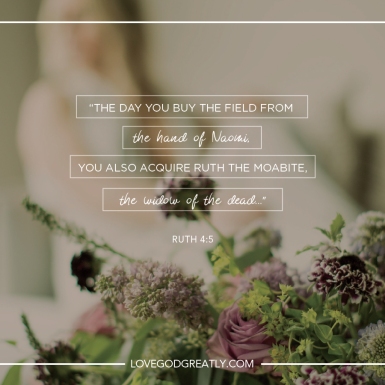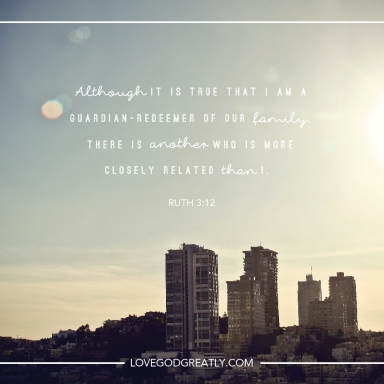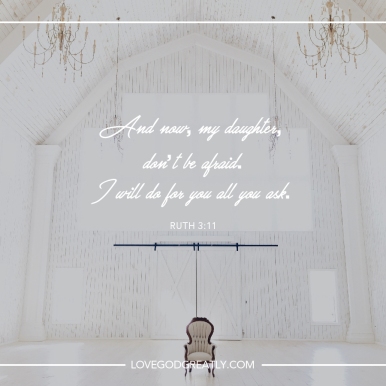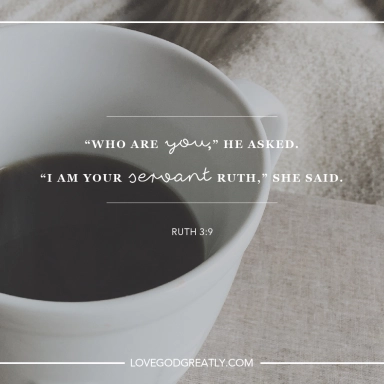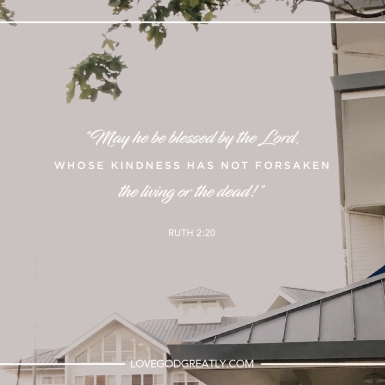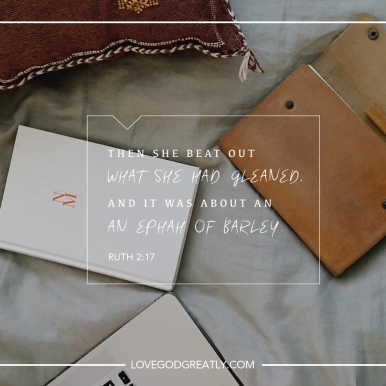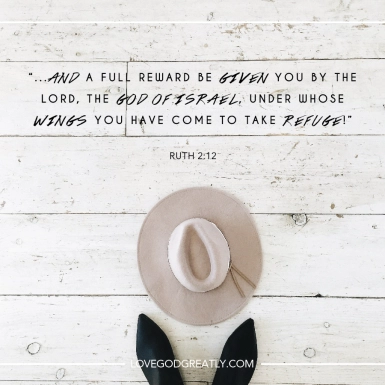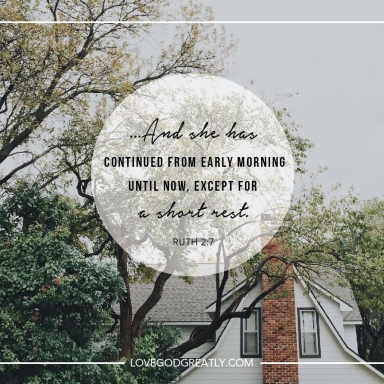Week Three – Day 5
Read Ruth3:14-18; I Thess. 4:3-4 SOAP Ruth 3:14-15
Why did Boaz have Ruth stay until morning? What does this say about his character?
14 So she lay at his feet until the morning, but arose before one could recognize another. And he said, “Let it not be known that the woman came to the threshing floor.” 15 And he said, “Bring the garment you are wearing and hold it out.” So she held it, and he measured out six measures of barley and put it on her. Then she went into the city. 16 And when she came to her mother-in-law, she said, “How did you fare, my daughter?” Then she told her all that the man had done for her, 17 saying, “These six measures of barley he gave to me, for he said to me, ‘You must not go back empty-handed to your mother-in-law.’” 18 She replied, “Wait, my daughter, until you learn how the matter turns out, for the man will not rest but will settle the matter today.”
1 Thessalonians 4:3-4 (ESV) – 3 For this is the will of God, your sanctification:[a] that you abstain from sexual immorality; 4 that each one of you know how to control his own body[b] in holiness and honor,
O – The word for the day – intentional. This whole passage is full of gestures of intentionality.
- Ruth laid (intentionally) at Boaz’ feet until morning. As one commentator said, “not at his side, but at his feet.” There was no question of impropriety here. No temptation. A covering of protection – not only for the body, but for her future, and also her reputation. There was no thought of possible impurity, but protection.
- Ruth and Boaz rose early, intentionally separating before workers came to the threshing floor. They didn’t want a hint of impropriety here, either, nor fodder for gossip. EVEN IF their motives were pure, and “nothing happened”, they also ensured that no one would THINK that something happened between them. Boaz probably didn’t send Ruth back in the night for her own protection from robbers or wrong doers, but he also sent her back early enough for her protection from gossip.
- Boaz intentionally provided for Ruth. He had her hold out her “garment” or apron, and filled it with barley – probably about 60 pounds! He is providing for the physical needs of Ruth and Naomi, even if he is not appointed the go’el. He did not want her to go back “empty-handed” to Naomi, maybe because she had been with him during the night and would be tired the next day.
- Naomi was intentional in asking Ruth what had happened. One commentator in PreceptAustin noted that the literal Hebrew was closer to “Who are you?” * Literally the Hebrew says Naomi asked “Who are you?” undoubtedly with a sense of anticipation. To phrase it another way Naomi appears to be asking… “Are you still Ruth the Moabitess or are you the prospective Mrs. Boaz?”* But she also calls Ruth “my daughter.”
- Boaz’s reputation led Naomi to believe that he would be intentional in following through his promise to deal with the matter of go’el that very day. “for the man will not rest….but will settle the matter today.” Naomi knew of his character, so knew that he would take care of the matter – of determining who would be go’el for Naomi and Ruth. From PreceptAustin: *Has settled (03615) (kalah) means to finish, complete, fulfill or bring this matter to an end. The primary meaning of kalah is to consummate or to bring to completion. Boaz will finish his task, working until the goal is accomplished. Sometimes the idea of exhaustion or of being entirely consumed is signified by this verb kalah. Naomi was confident that Boaz would not rest until he had settled the matter.*
- Naomi was intentional in her instruction to Ruth to wait. From PreceptAustin: * Wait (03427) (yasab/yashab) means literally to sit down, to dwell, to inhabit, to endure, to abide , to stay, to remain.
Our greatest strength is often shown
in our ability to stand still and trust God.
Naomi is gives Ruth a command to “Sit still. There’s nothing more for you to do.” The essence of Naomi’s encouragement to Ruth is seen in the following words from Be Still My Soul… ponder Katharina von Schlegel’s poignant stanza which speaks especially of God’s sovereignty and providential control over the events and circumstances of all of our lives…
Be still, my soul: thy God doth undertake
To guide the future, as He has the past.
Thy hope, thy confidence let nothing shake;
All now mysterious shall be bright at last.
A – What are my take-aways for today?
Be intentional.
- Although Ruth and Boaz’s motives were pure, they also had to ensure that gossip did not enter into their situation. So, they intentionally behaved so there was NO HINT of impropriety. Others should not see in me ANY HINT of impropriety or impure motives. Do I live a life that shows purity? Do I compromise in any way, so that there is no hint?
- Integrity – Do I show integrity in all that I do? Does my word count? Do I do what I say I do? or Do what I say I will do? Do I live life so that it is worth emulating?
Waiting – Do I wait patiently on God? Do I sit still, stand still, and be still? This is the hardest for me. I want instant results. God desires growth. If “be still” means “take your hands off” – do I do that? DO I allow God His time to do His work?
P – Father God, may You continue to work within me. Purify me. “Search me, O God, and know my heart! Try me and know my thoughts! And see if there be any grievous way in me, and lead me in the way everlasting!” Help me to be a woman of chayil, a woman of integrity, a woman with no compromise. A woman who keeps her word. A woman who is intentional in service – to You.
We must set right boundaries, position ourselves in right places, and pursue right relationships – for freedom’s sake and ultimately for the glory of our Father God. – Whitney, LGG post
Notes from PreceptAustin:
Hymn writer Phillips Brooks admitted,
“The hardest task in my life is to sit down and wait for God to catch up with me… The trouble is that I am in a hurry, but God isn’t.”
Haven’t we often felt the same? Yet patience is part of God’s strategy for maturing us. It’s a lost skill we all need to cultivate. If you have no joy because you’re always in a rush, slow down.
As Torrey wrote
Not so in haste, my heart! Have faith in God, and wait;
Although He seems to linger long, He never comes too late.
God is never in a hurry, but He is always on time. God stretches our patience to enlarge our soul. Ask yourself:
What circumstances make it hard for me to wait for the Lord?
How do I know I won’t be disappointed when I wait for Him?
George Matheson wrote,
We commonly associate patience with lying down. We think of it as the angel that guards the couch of the invalid. Yet there is a patience that I believe to be harder—the patience that can run. To lie down in the time of grief, to be quiet under the stroke of adverse fortune, implies a great strength; but I know of something that implies a strength greater still: it is the power to work under stress; to have a great weight at your heart and still run; to have a deep anguish in your spirit and still perform the daily tasks. It is a Christ-like thing! The hardest thing is that most of us are called to exercise our patience, not in the sickbed but in the street.
To wait is hard…
To do it with good courage is harder!
Henry Morris says that
Sometimes, when a believer has done all he knows to do according to God’s word, he must be content simply to “sit still,” and wait for God to work. (Morris, Henry: Defenders Study Bible. World Publishing)
O my soul, wait on the Lord
And know He sees your need;
He’ll make His presence known to you
Through word or kindly deed. —D. De Haan
Those who wait on the Lord
will never be disappointed.
SIT STILL
Wait my daughter – Are you like Ruth or more like Martha in Luke10 who was…
distracted with all her preparations and… worried and bothered about so many things? (Luke 10:40, 41)
Then to calm your nerves and keep you from rushing ahead of the Lord, meditate on Naomi’s advice to Ruth, along with two other closely related exhortations in Scripture.
“Sit still…until you know how the matter will turn out” (Ru 3:18–note, NKJV)
How can we “sit still”? One way is to wait on the Lord in prayer, not wasting your time but investing it in eternity. God is preparing you and your circumstances so that His purposes will be accomplished. However, when the right time arrives walk out in obedience and in faith, do not delay.
STAND STILL
Do not fear! Stand still and see the salvation of the LORD which He will accomplish for you today; for the Egyptians whom you have seen today, you will never see them again forever. (Ex 14:13)
Moses gave this command to the people of Israel as the Egyptian army was pressing in to destroy them. When God tells us to “Stand still “, there is no need to panic, for the Almighty, omnipotent God has the situation well in hand. And when He commands to “go forward” (Ex 14:15) as He did Israel, and He will lead us through “the sea” step by step. There is a time to stand and a time to move out, and we must be alert to know and do whichever God wants us to do.
BE STILL
Be still, (command; Heb = relax, hang limp; Lxx = Be at leisure) and know (command) that I am God; I will be exalted among the nations, I will be exalted in the earth. (Ps 46:10–note)
The truth in this Psalm provides a wonderful antidote for a restless spirit. The Hebrew word translated “be still” means “take your hands off, relax.” It’s so easy for us to get impatient with the Lord and start meddling in matters that we ought to leave alone. He is God, and His hands can accomplish the impossible. Our hands may get in the way and make matters worse.
When the Lord arranges the circumstances of our life so that we must “wait“, then we need to take heart from these exhortations to sit still, stand still and be still. God is in control.
Warren Wiersbe comments on Ps 46:10 noting that…
The Hebrew word translated “be still” actually means “take your hands off.” God is saying to us, “Take your hands off, and let Me be God in your life.” So often we want to manipulate and control. We talk about those who are “hands on” people. In the Christian life, God uses our hands. He used Noah’s hands to build the ark. He used David’s hands to kill a giant. He used the apostles’ hands to feed 5000 people. But sometimes only God’s hand can do the job. Sometimes our hands get in the way because we are manipulating, plotting or scheming.
A friend of mine used to remind me, “Faith is living without scheming.” Whenever I discover myself pushing and prodding, God says to me, “Take your hands off. Be still, and know that I am God.” The difference is simply this. If we play God in our lives, everything is going to fall apart. But if we let Him truly be God in our lives, He will be exalted, He will be with us, and He will get the job done.
Are you facing a problem or a challenge today? Are you wondering what you will do? Give it to the Lord. A time will come when He will say, “All right, I will use your hands.” But until then, keep your hands off. Know that He is God. He does not expect us to do what only He can do. We can roll the stone away from the tomb of Lazarus, but only He can raise the dead. We can hand out the bread, but only He can multiply it. Let Him be God in your life.
To remain still seems to go against human nature. You want control. But as a believer, you need to remain yielded to God’s will and give your burdens to Him. What problem are you facing? Are you keeping your hands off and allowing Him to work in your life? (Warren Wiersbe. Prayer, Praise and Promises).
“Need You Now (How Many Times)” – https://www.youtube.com/watch?v=9tivseVZbnY
Well, everybody’s got a story to tell
And everybody’s got a wound to be healed
I want to believe there’s beauty here
‘Cause oh, I get so tired of holding on
I can’t let go, I can’t move on
I want to believe there’s meaning here
How many times have you heard me cry out
“God please take this”?
How many times have you given me strength to
Just keep breathing?
Oh I need you
God, I need you now.
Standing on a road I didn’t plan
Wondering how I got to where I am
I’m trying to hear that still small voice
I’m trying to hear above the noise
How many times have you heard me cry out
“God please take this”?
How many times have you given me strength to
Just keep breathing?
Oh I need you
God, I need you now.
Though I walk,
Though I walk through the shadows
And I, I am so afraid
Please stay, please stay right beside me
With every single step I take
How many times have you heard me cry out?
And how many times have you given me strength?
How many times have you heard me cry out
“God please take this”?
How many times have you given me strength to
Just keep breathing?
Oh I need you
God, I need you now.
I need you now
Oh I need you
God, I need you now.
I need you now
I need you now
